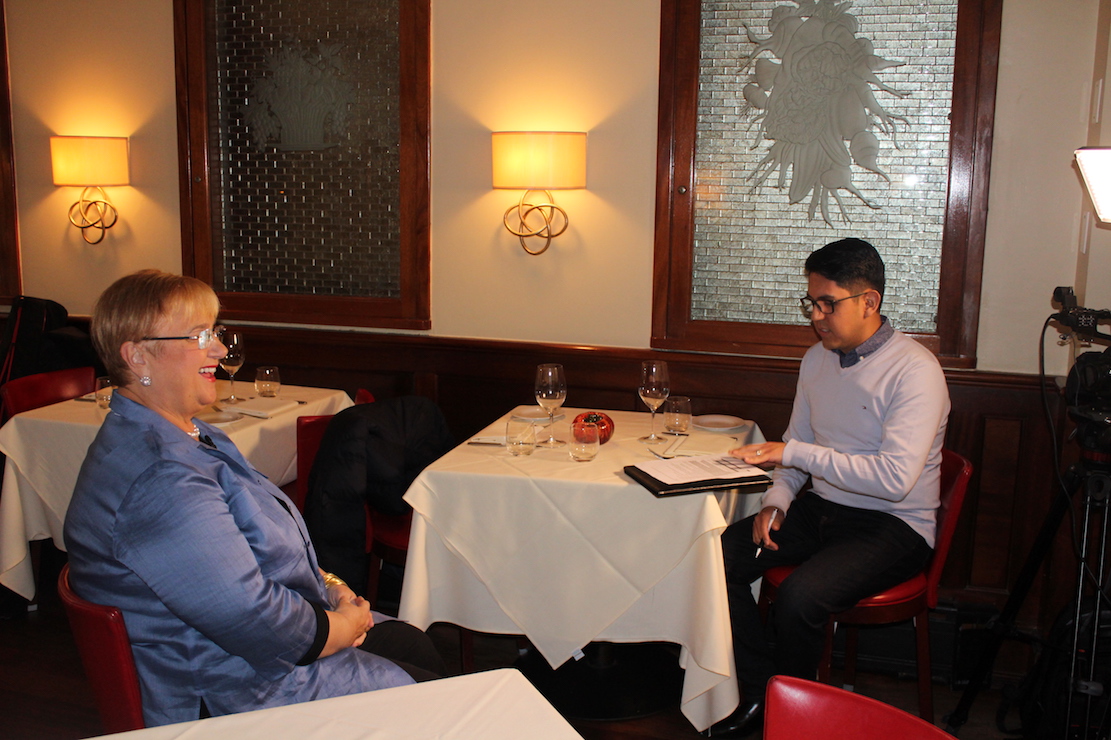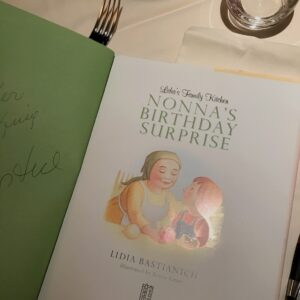In America, when one thinks of Italy, one thinks of food, and Lidia Bastianich’s food is Italian cuisine par excellence. On a cold and rainy afternoon in New York, we had the pleasure of meeting chef and TV personality, Lidia Bastianich, at her three star restaurant, Felidia. Our objective was to understand the role that sustainability and Made in Italy plays in her business. This interview is part of the “Business Italian Style 2: Food Innovation, Sustainability, and Made in Italy” project.

Lidia Bastianich embodies the “American Dream”– wanting it all and achieving it! She was born in Istria, a region with a strong Italian presence that was annexed by Communist Yugoslavia after World War II. Née Lidia Matticchio, she grew up with her grandmother on a farm. At age nine, she was forced to seek refuge with relatives in Italy for three years prior to emigrating to America with her family. She opened her first restaurant in 1971 in Queens and from there started a long and successful career.
Named “best chef in New York” by the prestigious James Beard Foundation in 1999, Lidia Bastianich is more than just a chef. With activities in different sectors of the food business, her name and her vivacious face expression have become a brand. She won an Emmy Award in 2013 as the hostess of cooking shows on public television. She writes books for kids as well as best-selling cooking books such as Lidia’s Italian-American Kitchen, Lidia’s Italy and Lidia’s Family Table. And she has a blog and a YouTube channel with thousands of views. In 2002, U.S. Senator George Onorato described her as “The First Lady of Italian Cuisine and Restaurants in the United States.” Besides New York, where she owned and ran a number of iconic restaurants, Lidia Bastianich opened restaurants all over the States, from Kansas City to Pittsburgh, and she is a partner of Eataly for North and Latin America. Also, in 2010 she launched Nonna Foods, a product line including kitchen tools, pasta and sauces. With her son Joe, she produces wines from vineyards in various regions of Italy, such as Friuli and Tuscany.
First with her grandmother, and then with her mother, Lidia became interested in cooking from an early age, learning the values of a “healthy and good cuisine representing a people.” Through the teachings and the example of the women in her family, Bastianich internalized the importance of sustainable food.
It is no coincidence that family is a recurring presence in Lidia Bastianich’s books and TV programs, as well as in her business activities. References to the family often occur in her speeches and stories. As she explained to us, her mother Erminia, and her grandmother Rosa, have been a constant source of inspiration for Lidia Bastianich, not only as strong and successful women, but also as entrepreneurs. Her grandmother, the chef told us, was very close to the family and oversaw everything in the farm: she took care of the livestock, cultivated the land, and cooked. “We used to make oil – she explains – flour, prosciutto. We had pigs, hens, eggs, so I was always connected with the food sources.”
These experiences and values are reflected in the way the Istrian chef wanted to convey and translate Italian cuisine to Americans. She believes, indeed, that Italian cuisine is the number-one ethnic cuisine in the U.S. because it is a cuisine of quality, original and traditional, all key elements of Made in Italy. Moreover, as she reminded us during our interview, Italy is the healthiest country in the world, thanks to its lifestyle and healthy diet, a view that was recently confirmed by the Bloomberg Global Health Index 2017 data. This recognition proves how deeply food culture may affect the well-being of human beings as well as of the environment. Speaking about this, Lidia Bastianich explained how she “communicates Italian culture through food” in her companies, using local products, keeping the management of her businesses in the hands of her family, creating culinary traditions and handing down recipes and the business to her children and grandchildren.

“Italian cuisine is very conscious of food sustainability – Bastianich explains – it is very tied to the earth, to the seasons.” And this she knows well because, as a young girl with her grandmother in Istria, they cultivated everything that was served at the table. But now, as a chef and businesswoman, her approach to sustainability has a deeper meaning: “I must be aware of what to buy, how to recycle, how to make dishes using everything, without wasting anything.”

As her grandmother did with her, Lidia too wanted to impart these values to her grandchildren, and others: she wrote three children’s books that convey the values linked to food sustainability and the importance of having a close-knit family. By so doing, the chef wants to share her passion with future generations.
From her mother, Lidia inherited courage: “It was tremendously courageous for my mother to choose to migrate to the United States with her husband and two children, not knowing a word of English nor where she was going.” This spirit lives on in Lidia and reminds her of the importance of staying connected with her own roots.
In the U.S. Bastianich has embraced her new world and the opportunities that it has offered to her, adapting herself to American culture, yet without losing her native culture. “It is very important to maintain the essential elements of a culture, and language as its basis.” The chef, in fact, makes great use of the Italian language in all her communications. Her cookbooks are filled with Italian terms, as are her menus. In her restaurants, she speaks Italian with her staff and on her TV shows she often uses words and phrases borrowed from her native language. In this manner, she shares Italy and the Italian language with everyone.

We close our interview by asking some tips for the future to someone who, aiming for simplicity and genuineness, has managed to build an empire. Lidia Bastianich’s philosophy is simple: it is necessary to grab opportunities when they present themselves, while pursuing your own passions and working hard. This is how success is built. In the meantime, she remains humble; her greatest satisfaction is having her two children close, even in business, and being able to share her cooking with them.
In her restaurants and TV shows, in her business ventures with the various Eataly locations, even in her books for children, Bastianich embodies the intersection between the philosophy of sustainability and Made in Italy. To build business while respecting the natural and social environment, to start from a small scale, to seek authenticity, and to remain attached to one’s roots are principles that are not limited to the geographical boundaries of Italy but are rather capable of generating a profound change worldwide.
This is one of the three-episodes series Business Italian Style 2, a project in its second edition, developed by The Inserra Chair in Italian and Italian American Studies (Italian Program at Montclair State University) and La Voce di New York, within the Business Italian class (ITAL321) taught by Enza Antenos. Each of the three parts focuses on the link between Italian food, made in Italy and sustainability. The interviews were designed by the Business Italian students.
The other two episodes of the series:
Interview with Eataly head buyer Dino Borri.
Interview with illycaffè CEO Andrea Illy.
Here the first edition of the project Business Italian Style.










